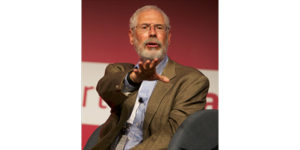On August 31st, Columbia Entrepreneurship hosted a two-day seminar on Lean Launchpad education taught by longtime Berkeley-Haas Entrepreneurship Professor and founder of the Lester Center, Jerry Engel.
The “train-the-trainers” workshop took place in the beautiful, new Columbia Entrepreneurship Design Studio- at the Riverside Church- which is a terrific forum for cross-campus entrepreneurship and innovation gatherings such as these.

Columbia faculty and staff from all corners of the institution participated- it was truly a great opportunity for cross-pollination. Faculty from SIPA, Columbia Law, Public Health, the Medical School, Journalism, the Brown Institute, Columbia Entrepreneurship, Columbia Business School, the School of Professional Studies, Columbia Engineering, the Coulter Foundation, PowerBridge, Columbia Technology Ventures and even instructors and faclty from New York University and NYC Media Lab.
So what is Lean?
Well, it’s a long story- but in effect, it is a methodology and approach to launching startup companies that has electrified and transformed the startup community worldwide. It is the brainchild of Columbia Entrepreneurship’s Special Fellow, Steve Blank.

Steve, a Silicon Valley Veteran of 8 high-tech startups developed this approach after retiring some 10 years ago and doing some deep reflection on why some companies of his worked and some didn’t. He realized that entrepreneurs were incorrectly modeling and structuring their startups after “mature companies” rather than realizing that startups are really “temporary organizations in search of a business model.” Implicit in this understanding is that founders are really only operating on a series of hypotheses about what their customers actually want – and were often deeply mistaken about those customer needs. Enter the whole concept of “customer development”, which Steve perfected- exhorting founders to relentlessly interview hundreds of potential customers to ascertain what their true pain points are- and to only then tailor the startup’s product to those needs. But you don’t stop there- you continually keep up this dialogue and iteration on the product until your “temporary organization” achieves “product-market” fit. Suddenly you have a real business on your hands.
Sounds obvious in hindsight, right? But the reality is most founders don’t put this necessary work in and simply think they know what to build for their customers.
The Lean Startup movement has resonated so deeply with the global entrepreneurship and the university entrepreneurship communities, that it has since even been adopted by the NSF and NIH as the I-Corps program.
And so what does all this mean for Columbia writ large?
Well, we already hold a university-wide week-long session called Lean Launch Pad (LLP) taught by Steve every January and TA’d by our own colleague Nat Kelner. This is available for all Columbia students. You must apply as a team and it is a great opportunity to put your idea through the paces of intense customer development over the course of one week. You will rapidly determine whether this is something for you or not.
Secondly, Steve is already applying his LLP methodology to individual disciplines. This is his “Hacking for” Series. The most recent iteration is Hacking for Defense (H4D), a course taught at Stanford University. H4D is about using lean methodologies to solve Department of Defense and Intelligence Community problems. Thus, with the H4D and the I-Corps program, we’re beginning to see is that the LLP approach is generalizable and can embrace the challenges faced by a range of organizations that measure their success not in terns of revenue and profit but rather by creating public value for their constituents.
Bringing it all together, we believe that Jerry’s course will begin to infuse the Lean Launchpad methodologies throughout the university and that it will broaden what it means to be an innovator. Universities exist in part to solve the great issues of our time – from climate change to national security. In order to do so, Columbia Entrepreneurship is committed to supporting its faculty, students, staff and alumni to be innovative and entrepreneurial in all their endeavors. With the help of people like Steve Blank and Jerry Engel we believe that we’ve made a good start.


